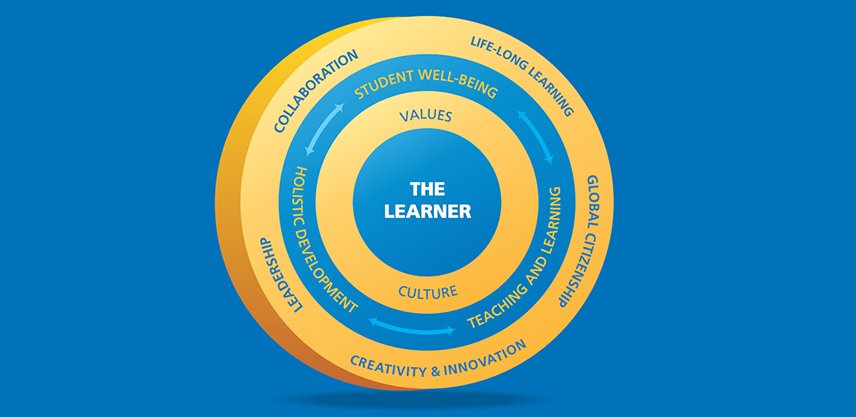Curriculam Model
The MKPS Curriculum Model represents the School’s commitment to optimise teaching and learning, and facilitate children’s holistic development and well-being. Through a curriculum that is stimulating and creative, and an environment that is safe and child-centred, we enable the learner to explore multiple dimensions of excellence, encompassing intellectual, social, emotional and physical development. There is equal emphasis on academic rigour and engagements beyond the classroom, through a wide spectrum of opportunities.
The School’s guiding statements underpin the facts that cherishing one’s own culture and respecting that of others, as well as values-based learning, are pivotal to holistic development. The educational programmes at the School focus on inculcating in the learner five key attributes: creativity and innovation, collaboration, leadership, global citizenship and life-long learning.
All the elements in our curriculum model converge to bring out the best in every child and enable them to be on the path of continuous development and progress.

Student Well Being
We recognise the importance of meeting the unique learning needs of every child by providing a safe, supportive and respectful environment. Through individualised attention that appreciates children’s learning styles and differing abilities, by helping them cope with emotional challenges and by providing them guidance to select higher education pathways, we work for their well-being, within the school and beyond.
Our student care team, comprising qualified professionals, work with class teachers and parents to provide appropriate support, enabling students to cope with academic demands and challenges, and manage them in constructive and creative ways. Wherever required, the student care team consults with outside therapists and educational psychologists in evaluating or addressing student needs.
Holistic Development
A holistic approach to teaching and learning is important for the physical, emotional, intellectual, creative, spiritual and social well-being of children, and to develop them as well-rounded individuals. At MKPS, we lay emphasis on experiential and exploratory methods of learning, well beyond the classroom, as well as encouraging the appreciation and practice of our school’s values and attributes.
We strive to ensure that holistic approaches to teaching and learning are achieved in multiple ways – ongoing review of curricula, introduction of new subjects, the breadth of sports and co-curricular activities, and the regular upgrading of infrastructural facilities and resources.
In the classroom, students present their work by way of presentations, role plays, small skits and impromptu debates. The students have many out-of-classroom activities and experiences such as music, football, cricket, tennis, basketball, taekwondo, skating and many more. Community Service helps sensitize children to the values of being compassionate about the needs of the less-privileged.
Teaching and Learning
Our K-11 curriculum uses a variety of engaging teaching and learning methodologies that challenge and motivate learners to excel. It focuses on nurturing in them knowledge and skills essential for success in the 21st century.
Inquiry-based and application-oriented approaches across all subjects and age groups enable students to learn about and respect a range of ideas, independently and collaboratively with others. It helps them develop new perspectives and take responsibility for their learning.
The school provides professional development opportunities for teachers by way of participation in workshops and seminars, as well as exchange programmes with schools worldwide. Our teachers make use of flipped classrooms, project-based learning, brainstorming, role play, interactive lab experiments and self and peer evaluation, to make learning more engaging and effective.
Our educational programmes help students:
- develop the confidence to work with information and ideas – their own and those of others
- take responsibility for themselves and their actions and be respectful of others
- become reflective learners and be able to identify their ongoing learning needs
- be creative, innovative and fully equipped for future opportunities and challenges
- be articulate, effective communicators, and express themselves appropriately
- leverage technology in enhancing the learning experience
- empathise with others and understand and appreciate diversity
- develop as responsible individuals who enjoy a healthy, active and balanced lifestyle
- be engaged citizens, contribute to the community and address global challenges
